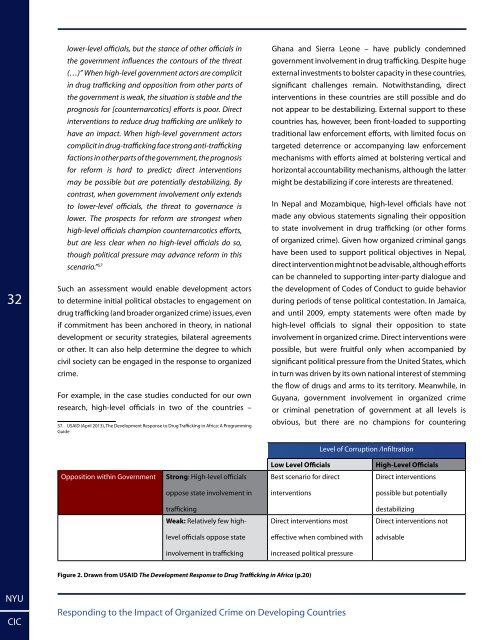here - Center on International Cooperation - New York University
here - Center on International Cooperation - New York University
here - Center on International Cooperation - New York University
Create successful ePaper yourself
Turn your PDF publications into a flip-book with our unique Google optimized e-Paper software.
32<br />
lower-level officials, but the stance of other officials in<br />
the government influences the c<strong>on</strong>tours of the threat<br />
(…)” When high-level government actors are complicit<br />
in drug trafficking and oppositi<strong>on</strong> from other parts of<br />
the government is weak, the situati<strong>on</strong> is stable and the<br />
prognosis for [counternarcotics] efforts is poor. Direct<br />
interventi<strong>on</strong>s to reduce drug trafficking are unlikely to<br />
have an impact. When high-level government actors<br />
complicit in drug-trafficking face str<strong>on</strong>g anti-trafficking<br />
facti<strong>on</strong>s in other parts of the government, the prognosis<br />
for reform is hard to predict; direct interventi<strong>on</strong>s<br />
may be possible but are potentially destabilizing. By<br />
c<strong>on</strong>trast, when government involvement <strong>on</strong>ly extends<br />
to lower-level officials, the threat to governance is<br />
lower. The prospects for reform are str<strong>on</strong>gest when<br />
high-level officials champi<strong>on</strong> counternarcotics efforts,<br />
but are less clear when no high-level officials do so,<br />
though political pressure may advance reform in this<br />
scenario.” 57<br />
Such an assessment would enable development actors<br />
to determine initial political obstacles to engagement <strong>on</strong><br />
drug trafficking (and broader organized crime) issues, even<br />
if commitment has been anchored in theory, in nati<strong>on</strong>al<br />
development or security strategies, bilateral agreements<br />
or other. It can also help determine the degree to which<br />
civil society can be engaged in the resp<strong>on</strong>se to organized<br />
crime.<br />
For example, in the case studies c<strong>on</strong>ducted for our own<br />
research, high-level officials in two of the countries –<br />
57. USAID (April 2013), The Development Resp<strong>on</strong>se to Drug Trafficking in Africa: A Programming<br />
Guide<br />
Ghana and Sierra Le<strong>on</strong>e – have publicly c<strong>on</strong>demned<br />
government involvement in drug trafficking. Despite huge<br />
external investments to bolster capacity in these countries,<br />
significant challenges remain. Notwithstanding, direct<br />
interventi<strong>on</strong>s in these countries are still possible and do<br />
not appear to be destabilizing. External support to these<br />
countries has, however, been fr<strong>on</strong>t-loaded to supporting<br />
traditi<strong>on</strong>al law enforcement efforts, with limited focus <strong>on</strong><br />
targeted deterrence or accompanying law enforcement<br />
mechanisms with efforts aimed at bolstering vertical and<br />
horiz<strong>on</strong>tal accountability mechanisms, although the latter<br />
might be destabilizing if core interests are threatened.<br />
In Nepal and Mozambique, high-level officials have not<br />
made any obvious statements signaling their oppositi<strong>on</strong><br />
to state involvement in drug trafficking (or other forms<br />
of organized crime). Given how organized criminal gangs<br />
have been used to support political objectives in Nepal,<br />
direct interventi<strong>on</strong> might not be advisable, although efforts<br />
can be channeled to supporting inter-party dialogue and<br />
the development of Codes of C<strong>on</strong>duct to guide behavior<br />
during periods of tense political c<strong>on</strong>testati<strong>on</strong>. In Jamaica,<br />
and until 2009, empty statements were often made by<br />
high-level officials to signal their oppositi<strong>on</strong> to state<br />
involvement in organized crime. Direct interventi<strong>on</strong>s were<br />
possible, but were fruitful <strong>on</strong>ly when accompanied by<br />
significant political pressure from the United States, which<br />
in turn was driven by its own nati<strong>on</strong>al interest of stemming<br />
the flow of drugs and arms to its territory. Meanwhile, in<br />
Guyana, government involvement in organized crime<br />
or criminal penetrati<strong>on</strong> of government at all levels is<br />
obvious, but t<str<strong>on</strong>g>here</str<strong>on</strong>g> are no champi<strong>on</strong>s for countering<br />
Level of Corrupti<strong>on</strong> /Infiltrati<strong>on</strong><br />
Low Level Officials<br />
High-Level Officials<br />
Oppositi<strong>on</strong> within Government<br />
Str<strong>on</strong>g: High-level officials<br />
Best scenario for direct<br />
Direct interventi<strong>on</strong>s<br />
oppose state involvement in<br />
interventi<strong>on</strong>s<br />
possible but potentially<br />
trafficking<br />
destabilizing<br />
Weak: Relatively few high-<br />
Direct interventi<strong>on</strong>s most<br />
Direct interventi<strong>on</strong>s not<br />
level officials oppose state<br />
effective when combined with<br />
advisable<br />
involvement in trafficking<br />
increased political pressure<br />
Figure 2. Drawn from USAID The Development Resp<strong>on</strong>se to Drug Trafficking in Africa (p.20)<br />
NYU<br />
CIC<br />
Resp<strong>on</strong>ding to the Impact of Organized Crime <strong>on</strong> Developing Countries
















